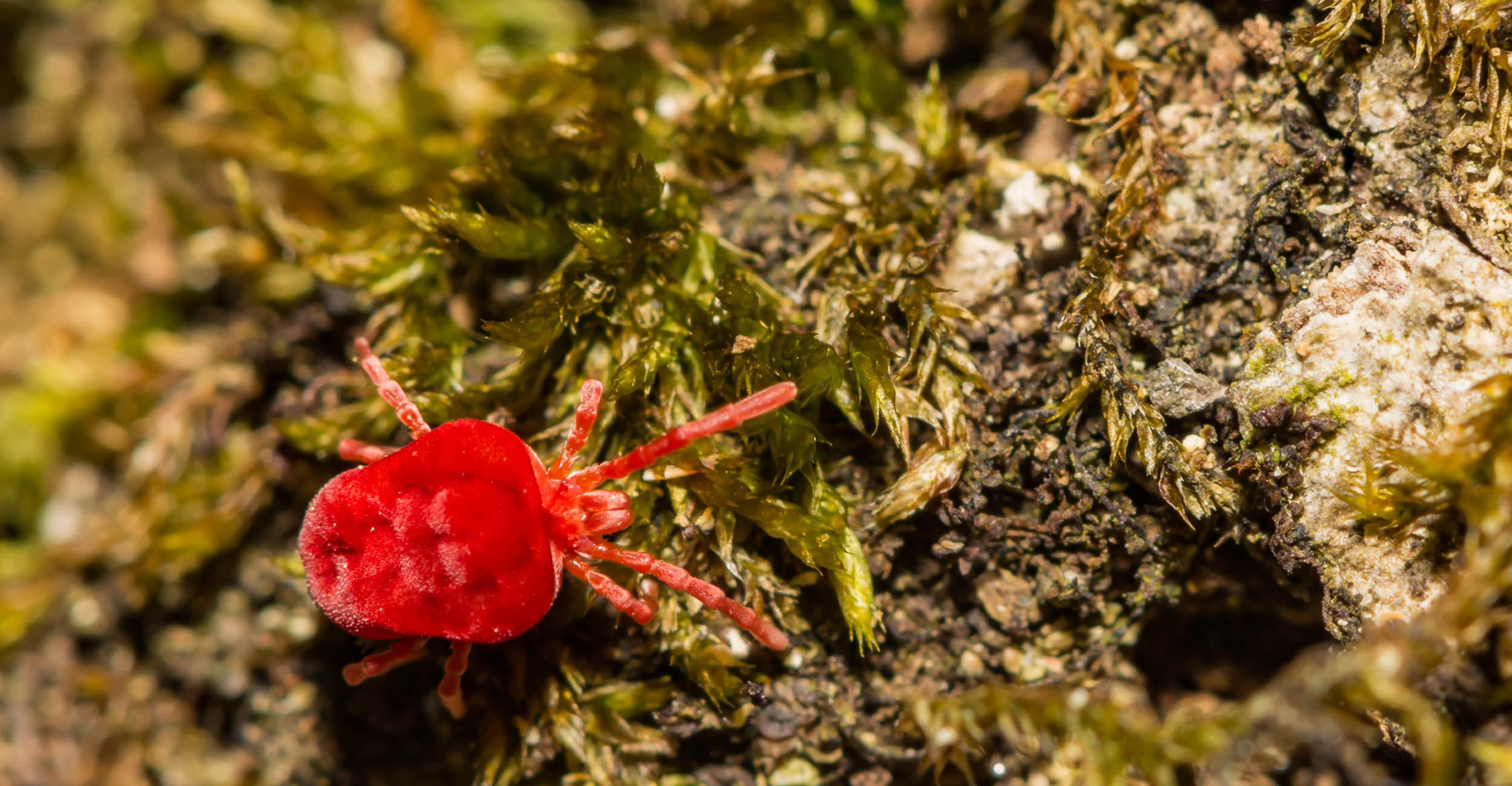
Not Just a Southern Story
You know that annoying feeling when you just want a little fresh air—maybe you’re lying in some tall grass, or getting wild hiking on a summer trail—and then, hours later, the itch kicks in? Yeah… chiggers. The tiny villains nobody sees coming (literally, they’re like microscopic ninjas). But you’re not alone if you’ve ever wondered, “what states have chiggers?” Spoiler: way more than you think.
Here’s the subtle mistake a ton of people make—assuming chiggers are only a problem in a few southern swamps. That is so not true. These little mites are living it up across a shocking number of states, sometimes even right in your backyard. I found that out the itchy way, but I’ll get to that in a bit.
The Chigger Hot Zone Map
So, where do you really need to watch out? Here’s where the chigger population blows up—and why. Picture a map with hot red blobs all around the southeastern and midwestern US. States with the highest “party density” for chiggers include:
| State | Why Chiggers Love It |
|---|---|
| Missouri, Arkansas, Oklahoma, Nebraska, Iowa | Lower Midwest. Tall grass, riverbanks, thick weedy stuff—total chigger heaven. Moist + warm = big populations. |
| Florida, Georgia, Alabama, Mississippi, Louisiana, Texas | Southeast/south. Humid, tons of water, sticky warm summers. (Basically, a spa day for chiggers.) |
| Kansas, Illinois, Indiana, Ohio, Michigan | Midwest. Fields, farms, parks—so many bites have happened out on prairie trails, trust me. |
| Even up north: Great Lakes, Kentucky, Tennessee, Virginia | More scattered, but yes, people report chiggers well into these northern spots, especially if summer’s been rainy. |
To be honest, if your state has hot, sticky summers and anything green that doesn’t get mowed for a week… well, you’re probably in “chigger country” according to research on distribution. Even Arizona (yep, I was shocked too) has reports of chiggers in grassy spots after monsoon storms. So, the answer to what states have chiggers? Almost all of them. Just more in some than others.
Why Are They Partying Here?
Now, you might be asking—why do these mites love those states so much? It’s not just blind luck. Chiggers are all about warm, moist vibes. They adore:
- Grass up to your knees? Prime real estate.
- Riverbanks, lakesides, ponds with weedy edges? Even better.
- Shady, damp scrub at the edge of woods? Jackpot.
If you want to go down the science rabbit hole, it’s basically temps above 60°F (they get lazy under that), ideally 77-86°F… and a little humidity is the secret sauce explained by field research. Even if you’re not deep in the South, those temporary muggy summers can fire up little chigger hotspots.
Anecdote time: My cousin in Nebraska once hosted a post-wedding barbeque—outfit adorable, grass freshly cut, vibe? Not so much after half the guests started doing the “ankle scratch shuffle” that night. I think everyone learned the hard way: “what states have chiggers” isn’t just a trivia question. It’s a public service announcement.
Misconceptions About Where Chiggers Live
A lot of folks think you only get chiggers if you go deep into some backwoods jungle, or maybe you’re safe if it’s just your backyard. Nope. Chiggers—in true mischievous fashion—love any patch of nature that gets a little wild. Your own yard, a picnic-friendly park, half-forgotten sports fields, that trail your dog loves to sniff around… all fair game.
I wish I’d known that before my first epic round of bites. (Let’s just say, as a kid, when you ignore your parent’s warning to stay out of “the weeds” along the neighborhood stream, you pay… dearly.)
How Do People Get Tricked?
It’s the classic “I don’t see any bugs, I’m fine” argument. Chiggers are so small you need a magnifying glass. You could literally have dozens on your socks or waistline and not see a thing until you’re clawing at insanely itchy welts. And here’s the part that gets everybody: they don’t fly, they don’t jump from trees—basically, you brush through grasses or weeds, and they latch on. The old tale about chiggers coming from Spanish moss? Myth.
The Itchy Details: Chigger Bites Up Close
Let’s get into the “ouch” part of what states have chiggers. The bites. You might not spot the actual bug, but you sure feel what they leave behind:
- You’ll feel it before you see it. Bites start itching 3-6 hours after you’re outside.
- They love tight spots. Ankles, waistbands, sock lines, behind knees, even armpits. (Who knew?)
- Clustering is their signature. Itchy red bumps, often in a line where your clothes pressed the little monsters into your skin.
- Intense, long-lasting itch. For some, it can last days—even weeks.
And here’s the kicker—chiggers don’t burrow under your skin. They inject a little enzyme to break down your skin cells so they can snack (gross, right?), and your body’s “Nope!” reaction creates the itchy bump. If you want to double-check those mysterious rashes, peep some Chiggers bites pictures to compare. (Sorry in advance… they really do make you wince.)
Spotting The Difference: Is This a Chigger Bite?
Torn between blaming a mosquito, a chigger, or maybe poison ivy? Here’s a rough cheat sheet:
| Bite Source | Looks Like | Itch Factor | Favorite Spots |
|---|---|---|---|
| Chiggers | Clusters, red & bumpy, lines where clothes press | Worst ever (intense, lingers) | Ankles, waistband, tight spots |
| Mosquitoes | Single red bump, puffy | Comes and goes | Any exposed skin |
| Poison Ivy | Patches, often blistery or streaky | Sting & itch for days | Whatever brushed the leaves |
If you spent the day sitting on grass near a lake—I’d bet the farm it’s chiggers. (And if you’ve got a horror story about your own bites, you’re not alone!)
Do Chiggers Hibernate? (Winter Warnings!)
Quick detour: what about colder months? Is there ever relief? Well…sort of. Chiggers get slow and “hibernate” when it’s chilly out (around 50°F and below) but don’t write off winter adventures just yet. In some southern states—especially places like Florida, Texas, Georgia—warm snaps in winter can fire up a small second wave. (I learned this the hard way at a “January” BBQ in Houston…thanks, weather.)
Curious about which locations break the rules when it comes to what states have chiggers in the winter? Check out what states have chiggers in the winter—it just might save your ankles during a surprise mild spell.
The real world takeaway: don’t retire your bug spray or tall boots after the first frost if you live below the Mason–Dixon line. Some chigger families just hang tight, waiting for a warm weekend to crash your plans.
Wait—Do They Ever Truly Disappear?
If you’re in Arizona or up in the Rockies, congrats—you’ve won the chigger lottery (low risk). But after a few stormy days, even those states can have local flare-ups, according to some outdoorsy friends who’ve hiked the high grass after desert rains. Still, for most of us…chigger season is May to September, with possible encore performances in a mild winter.
Dodging the Itchy Bullet (Without Staying Inside)
Look, the answer to “what states have chiggers” isn’t meant to scare you out of sunsets and swimming holes. It’s just… be prepared, not paranoid. You can outsmart chiggers if you know their favorite moves.
Don’t Invite Them Home: Your Go-To Defenses
- Dress smart: Long pants, high socks, and tight cuffs. I know, not a summer fashion statement, but trust me—your future self will thank you.
- Repellents: DEET or permethrin spray on shoes/socks/clothes works wonders. Spray ahead of time so the smell settles in before you go out.
- Stick to trails: Don’t plunge through unmowed fields or bush-whack your own path if you can help it.
- Shower right after: The sooner you clean up, the less likely chiggers will get their snack.
- Launder clothes hot: A quick hot wash will knock off any possible “hitchhikers.”
Weirdly, the most effective thing I ever did was tuck pant legs into socks. Looked like I was prepping for a flood, but after watching a friend get covered in bites during a Missouri hike (while I stayed mostly itch-free), I was sold.
Quick Gear Table: Pros and Cons
| Tool | Pro | Con |
|---|---|---|
| DEET Spray | Easy, affordable, works on skin & clothes | Needs reapplying, strong scent |
| Permethrin-treated gear | Long-lasting, kills on contact | Prep ahead, never use on bare skin |
| Boots + Long Layers | Simple, physical shield | Hot, less stylish for summer selfies |
And hey, keep the what states have chiggers in the winter resource handy—plan your gear by season, not just location.
What If You Get Nailed Anyway?
Okay, you did everything “right” and still end up a human scratch post. Don’t panic. Here’s what works, promise:
- Wash with hot, soapy water ASAP (this removes lingering chiggers).
- Anti-itch creams—hydrocortisone or classic calamine lotion. (Lotion layering is almost an art in chigger country.)
- Cool compress. Less for science, more for your sanity.
- Try not to scratch—even though your body insists otherwise.
If things get weird (crazy swelling, infection, bad reaction), buzz your doctor. But for most of us, a few days of grumbling will do it.
Want a visual of what you’re up against? There’s never too much prep—check out Chiggers bites pictures for a dose of “know thy enemy.”
Does Anything Actually Repel Chiggers Long-Term?
Good question. Lawncare helps (keep it short, tidy up the edges), and sunlight matters! Chiggers hate hot, dry spots. Mowing and a bit of sunshine mean way less chigger drama. And if you hang laundry outside, just avoid letting it brush tall weeds. Trust me.
The Big Takeaway? Embrace the Outdoors…Wisely
If you made it this far, you’re dangerously close to “chigger expert” territory. But really, if there’s one thing everyone should know about what states have chiggers, it’s this—they’re almost everywhere, but never everywhere at once. Stick with a little caution, a lot of curiosity, and a bit of bug spray, and you’ll be fine.
Don’t let the itch monsters win! Go outside. Play, picnic, hike, and let the summer memories roll. Just pack a plan, keep those ankles covered, and don’t be afraid to peek at the what states have chiggers in the winter update if you’re feeling adventurous all year. Seen a weird rash or got a good itch story? Drop it in the comments—I promise, you’re in good company.

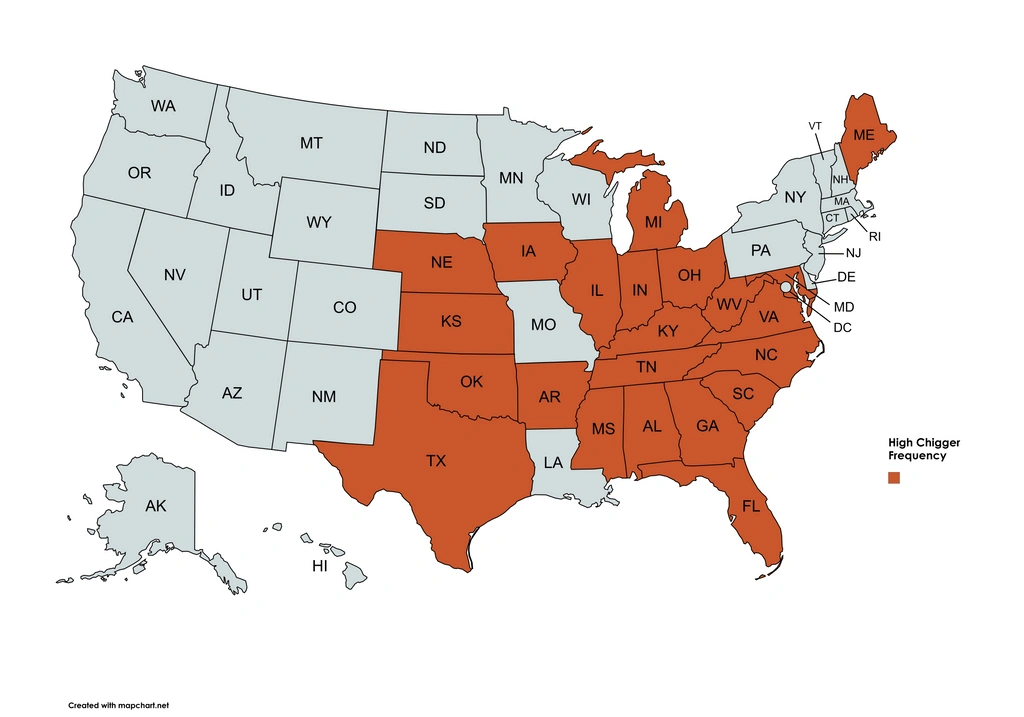

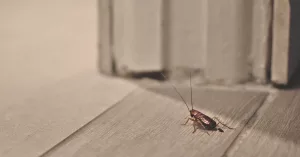
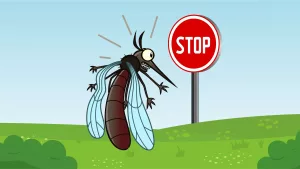
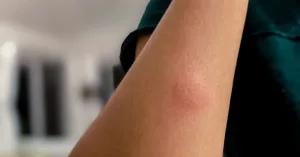
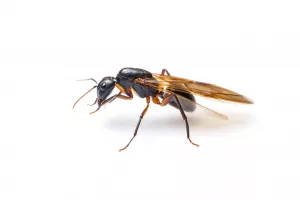
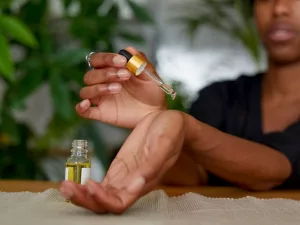

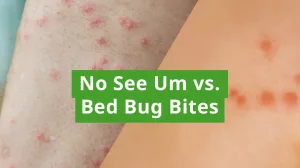















Leave a Reply
You must be logged in to post a comment.